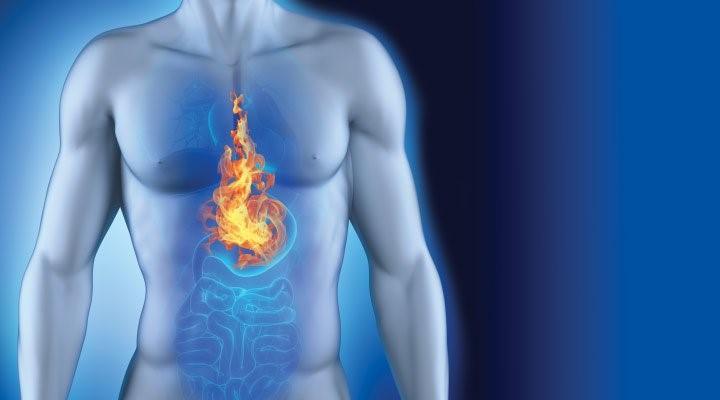
All About Acid Reflux Disease

If you’ve ever experienced heartburn, it may have been due to acid reflux. When you feel a burning pain around the chest or throat area, it is likely to be heartburn. You are experiencing this because the stomach acid is going back up into the food pipe – when it shouldn’t. Experts believe that acid reflux is one of the most common health conditions affecting those in the United States. 25 to 40 percent of Americans of all ages suffer from acid reflux symptoms.
What is acid reflux?
There is a valve at the entrance to the stomach, which is also a ring of muscle known as the lower esophageal sphincter (LES). When we eat, the LES opens to allow the food to pass through the stomach, but it closes immediately after. If the LES fails to close completely or opens too often, the stomach acid can move up into the esophagus. This produces the burning pain known as heartburn – no, it has nothing to do with the heart.
You may have heard people refer to acid reflux as gastroesophageal reflux disease (GERD). Although they are similar, they are not the same. GERD is a more severe form of reflux – which can progress from acid reflux. If you experience acid reflux more than twice in one week, the doctor may diagnose you with GERD.
What are the causes?
Acid reflux disease can be caused by many things – more things than you may be aware of. It can happen to anyone – regardless of age, weight, and gender. When the LES stops working properly, acid reflux may occur. It is unclear exactly what causes this to happen, but it has proven to be more prominent in those who meet the following criteria:
- Obesity
- Pregnancy
- Hiatal hernia (a condition where the top of the stomach projects above the diaphragm in the chest)
- Smoking
- Alcohol or caffeine consumption
- Consuming large meals
- Consuming the following foods
- Spicy foods
- Tomatoes and tomato sauce
- Garlic
- Citrus fruit and juices
- Onion
- Peppermint
- Chocolate
- Fried foods
- Fatty and greasy foods
- Salt
- Coffee
- Alcohol
- Soda
- Eating before bedtime
- Various medications (including antihistamines, calcium channel blockers, theophylline, and nitrates)
What are the symptoms?
Almost everyone experiences acid reflux at some point in their lives – heartburn usually gives it away. Heartburn is the primary symptom, but the pain can get intense. If you are lying down, the pain may move upwards toward the neck or throat. If the stomach fluid hits the back of the throat, you may get a sour or bitter taste in your mouth.
The most common symptoms, however, include the following:
- Heartburn
- Bitter or sour taste in the mouth
- Chronic dry cough
- Trouble swallowing
- Wheezing
- Hoarseness
- Chest pain
- Sore throat
If you are experiencing heartburn multiple times a week, along with the symptoms below, you might have GERD:
- Dry, persistent cough
- Wheezing
- Asthma and recurrent pneumonia
- Nausea
- Vomiting
- Throat problems
- Difficulty or pain when swallowing
- Chest pain
- Dental erosion
- Bad breath
What are the treatment options?
Most doctors will prescribe medication for those with acid reflux. Some over-the-counter medications may help reduce painful symptoms: antacids (ex: Tums), H-2-receptor blockers (ex: Tagamet HB or Pepcid AC), and proton pump inhibitors (ex: Prilosec OTC). In very rare and extreme cases, surgery may be necessary. However, it is not usually the first treatment option.
Remember, every type of medication comes with side effects. Consult with your doctor before starting or stopping a medication. Your doctor will be able to help you find a treatment plan or direct you to someone who can.
How can I prevent acid reflux?
Believe it or not, changing your lifestyle habits can help prevent against acid reflux. You can start with the most common changes like eating healthy, getting active, and drinking more water. You should also quit smoking, eat smaller portions, and avoid foods that can trigger acid reflux.
Digestive & Liver Disease Center of San Antonio
If you are suffering from acid reflux disease, visit the Digestive & Liver Disease Center of San Antonio. Our team is more than ready to administer a variety of acid reflux disease remedies. Dr. Robert Narvaez will give you the personalized care and attention you deserve. Every case is different, so our physicians are dedicated to finding you relief. For more information, call our office at (210) 941-1662.
You Might Also Enjoy...


How do I know if I need a cholecystectomy treatment in San Antonio?

Where do I find a hiatal hernia specialist in San Antonio?

How To Prevent Colon Cancer

Different Types of Colon Cancer and Treatments

